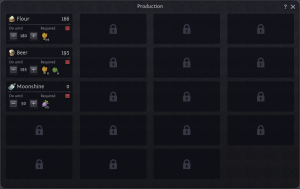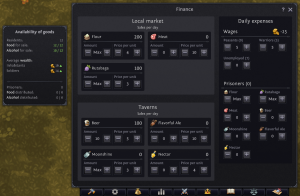Beginner's Guide: Difference between revisions
| Line 39: | Line 39: | ||
Every character consumes 1 food per day, so the amount of food produced should be at least equal to the population and the food price per unit should be lower than the workers' salary. Characters who work also need alcohol every few days and their mood can be regulated with the quantity and price of the sold alcohol. Slaves receive food (and alcohol if allowed) for free but require a functioning Slave Barns building for that. Markets open after 6 PM. | Every character consumes 1 food per day, so the amount of food produced should be at least equal to the population and the food price per unit should be lower than the workers' salary. Characters who work also need alcohol every few days and their mood can be regulated with the quantity and price of the sold alcohol. Slaves receive food (and alcohol if allowed) for free but require a functioning Slave Barns building for that. Markets open after 6 PM. | ||
Peasants will buy food from the Holy Caravan if prices are set too high. | |||
== Holy Caravan == | == Holy Caravan == | ||
Revision as of 18:08, 18 June 2024
Norland begins with you arriving in a small village with the intention of turning it into the thriving capital of your future kingdom.
After starting a new game, the difficulty of the game will gradually increase during the first few days after starting the game. New mechanics will be introduced gradually, allowing players to adapt and develop their settlement peacefully. This behavior can be disabled by enabling Hardcore mode when starting a new game but this is not recommended for new players.
Beginner tips
- Every game will start with a king and a heir and a queen who is captured in a forest bandits' camp. The first actual objective is to rescue her. In the beginning it is better to use mercenaries for armies. 5 or 6 mercenaries will be enough. They will arrive in one or two days, during which you can handle the initial settlement development.
- The first buildings that should be constructed are Lumbermill (for construction materials), Rutabaga Field (for food), Tavern (for selling alcohol), Altar (for satisfying the Piety need) and Library (for gaining knowledge).
- By creating a strong army you can force neighbors into vassalage and use their tribute for further development.
- Always assign lords to tasks best matching their skills:
- Lords with high
 Command skill can effectively destroy forest bandit camps, gaining rich loot.
Command skill can effectively destroy forest bandit camps, gaining rich loot. - Lords with high
 Management skill can produce a lot of extra goods - the more complex the goods and the higher the level of production building, the more profitable it is.
Management skill can produce a lot of extra goods - the more complex the goods and the higher the level of production building, the more profitable it is. - Lords with high
 Trade skill will help you make a profit when trading with neighbors or the Holy Caravan.
Trade skill will help you make a profit when trading with neighbors or the Holy Caravan. - Lords with high
 Persuasion skill are useful for effective convert actions on the world map and later improving relations with neighbors.
Persuasion skill are useful for effective convert actions on the world map and later improving relations with neighbors. - Lords with high
 Manners skill can seduce foreign lords to your side.
Manners skill can seduce foreign lords to your side. - Lords with high
 Teaching skill can quickly train peasants to use in place of expensive mercenaries.
Teaching skill can quickly train peasants to use in place of expensive mercenaries. - Lords with high
 Intellect skill will gain knowledge quicker.
Intellect skill will gain knowledge quicker.
- Lords with high
Defeating stronger enemies
If a neighbor becomes your enemy but their army is more powerful there are a couple of ways to weaken them:
- Reid their villages. This will slow down population growth and therefore Gold income, which will limit their ability to hire mercenaries.
- In the province menu use shadow operations - hire bandits to rob the hall, which will also reduce their hiring capabilities.
- Neutralize their lords with the highest Command skill using intrigues.
- Try to bribe the heir - he will start rebellion, which will greatly reduce the province's army and number of lords.
- Finally, you can sit out the dangerous time and gather strength by becoming someone's vassal, which will protect you from enemies.
Building management
Some buildings require workers and instructions to function and will display an icon above if they do not currently have any. Instructions are given by assigning a lord as a manager. The same lord can be appointed as manager to multiple buildings and will try to visit each building every day, starting with the buildings that require instructions the most. Failing that, the instructions given by them are valid for three days. Each lord gives a production bonus that scales with its Management skill.
Once the workers receive instructions from managers they will begin working. At 6 PM workers will carry the produced resources to the warehouse. After work they receive their salaries.
Buildings that produce basic resources will produce them continuously without any input from the player. But buildings that produce resources that require other resources need direct orders from the player in the Production menu, where you can either place a one-time order to produce a certain amount or set a continuous production until a set amount is reached.
Hovering over the Economic Summary will list buildings that do not have instructions, that have insufficient workers, that are broken or non-functioning, as well as fields on the verge of depletion.
Finance
The Finance menu is is where wages and the sale of resources can be adjusted. On the left side you can adjust the maximum amount of a certain resource that can be sold every day, as well as its cost. On the right side you can adjust the wages for the population. Peasants, Warriors and Unemployed are paid with Gold while slaves are paid with food and alcohol resources.
Every character consumes 1 food per day, so the amount of food produced should be at least equal to the population and the food price per unit should be lower than the workers' salary. Characters who work also need alcohol every few days and their mood can be regulated with the quantity and price of the sold alcohol. Slaves receive food (and alcohol if allowed) for free but require a functioning Slave Barns building for that. Markets open after 6 PM.
Peasants will buy food from the Holy Caravan if prices are set too high.
Holy Caravan
The Holy Caravan arrives every 2-3 days and is the primary source of Gold and Holy Rings. It's also a great source of books and slaves. Prices may randomly change but they also depend on a lesser extent on the Trade skill of the lord trading with the Holy Caravan.
Rebellions
There are three types of rebellions in the game, and each one poses a great danger to the lords.
- Slaves will rebel if their average mood over a day falls below 25.
- Warriors will rebel if their mood over a day falls below 25. They will form an army and attack the Hall to loot it, after which they leave and become forest bandits.
- Religious fanatics may rebel if the average mood of peasants over a day falls below 25. Before the rebellion they will give you the chance to avoid it by sacrificing a lord. Otherwise they will form an army and burn the Library and kill anyone who is insufficiently devout. If the bishop has a mortal enemy among the city's lords he can also trigger a religious fanatic uprising. All religious fanatic characters will join the rebellion, including lords.
- The heir or former heir may rebel if their loyalty drops to 0 and they are not on friendly terms with the king. In this rebellion a part of the army will join the rebel.
 Hooded Horse Wikis
Hooded Horse Wikis

